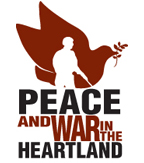
- Donate
- Donate through Springboard for the Arts
- Springboard for the Arts
-
Veterans Letters Project - Veterans Stories
-
Intergenerational Dialogue - Read the Blog
"Minnesota 8 Celebration" - Recognition & Awards event -
Media Coverage - ****Star Tribune****
Feb 6, 2008
"Heartland Activists"
Supporters
The Play - the playwright & some background of the times
Background pieces for the play - Chronology and Glossary. Play—post production |
"Peace Crimes: the Minnesota 8 vs The War," commissioned by the History Theatre and co-produced with the University of Minnesota Theatre Department, is drawn from a pre-prison memoir, "Outlaw or American Patriot?," and other trial event materials, including newspaper clippings, interviews with the mothers of the Minnesota 8, poems, counter-cultural "underground" pamphlets and newspapers, photographs, etc., written and/or collected by Frank Kroncke as he and Mike Therriault waited six months for their appeal decision to come down.
The resource materials are in a collection at the Minnesota History Center.
The Minnesota 8 were young people trying to determine whether the US government had lost its legitimacy and authority. Their draft raid actions were pre-Pentagon Papers and pre-Watergate scandal. They did occur during the period when college students were shot at Kent State and Jackson State. While President Nixon's Attorney General John Mitchell was the first AG ever indicted, that event was watched by the Eight while in prison.
Today, Americans are on the other side of Watergate and the Vietnam War political era, from John F. Kennedy to Richard M. Nixon. Many are no longer shocked by allegations that the Congress or President is lying or not being honest with the American people. But back in the '60s, young people like the Eight had grown up with an almost absolute trust in the word of political officials and government leaders. When Don Olson urged at trial that, “We cannot allow ourselves to be lied to by our leaders,” it was received with anger by many, incredulity by others, and it troubled many more. Don's assertion appears quite naive right now. Unfortunately, Don's voice was prophetic.
Two others: Bill Tilton, in his Closing Argument, "We want to make this into a society where not only the Vietnam War will stop, but hopefully all wars will stop." And Pete Simmons, “If nobody goes to war, then nobody goes to war.”
"Peace Crimes" occurs in what can almost be called an age of political innocence. The so-called Youth Movement or Hippie Counter-culture was idealistic at best, but also a flight from the continually unfolding war crimes of government leaders. When the My Lai massacre occurred, young people had no way to grasp that such not only was - but could be - done by American soldiers: their brothers, fathers, uncles, nephews, cousins .... (We Americans simply did not massacre, mistreat prisoners of war, and certainly were not torturers.)
One of the Eight, Mike Therriault took a poster showing the My Lai massacre into his local draft board when he and Don Olson went to refuse induction, and to urge others not to "step forward" and be inducted. Mike summed up the moral crisis of the '60s as he testified at our sentencing before Judge Phillip Neville.
| As American society
is constructed today, it forces all responsible My brother and sister, the choice is yours. What else can I say? |
And fitting the times and the impact of the Vietnam Veterans who opposed
the war, the final verdict on the '60s came from two Vietnam veterans,
|
"We know who the real criminals are,
and I think
|
ALERT! ALERT! ALERT! ALERT! ALERT! The military Selective Service Draft has been activated! What is your Lottery number? Click here to find out. |